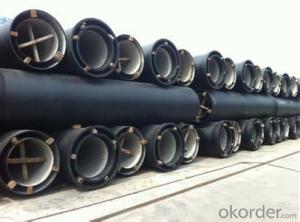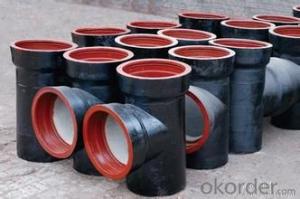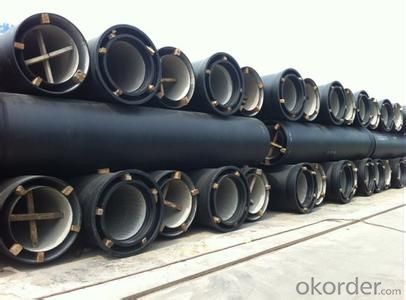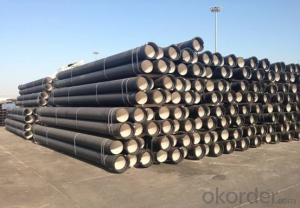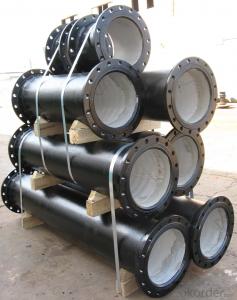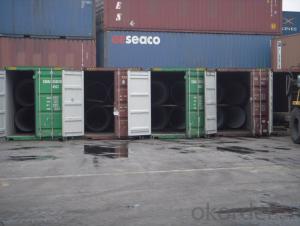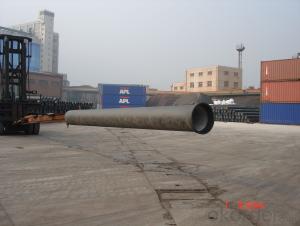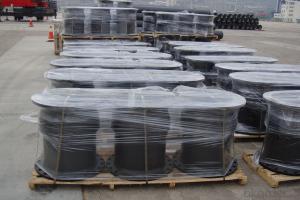DUCTILE IRON PIPES C Class DN400
- Loading Port:
- China Main Port
- Payment Terms:
- TT OR LC
- Min Order Qty:
- -
- Supply Capability:
- -
OKorder Service Pledge
OKorder Financial Service
You Might Also Like
Ductile Iron Cast Pipe is without any defects compare with tradition casting tech, which has many advantages particularly as follow:
(1) High density. In the "vertical upward casting" process, the melt iron of centre liquid column in center crystallizer is continuously feeding for volume shrinkage caused by condensation tube at outer circumference , which lead to be free of shrinkage porosity.
(2) High purity. When melt iron pouring, the mixed impurities such as gas, dross, sand grain which are lighter than melt iron could be eliminated at furnace mouth, its impossible to enter into the crystallizer through the channel, so the melt iron into the crystallizer is very pure.
(3) Strength with toughness. The cooling speed provided by continuous crystallizer is 30 times than sand casting and 5 times than centrifugal casting, and doesn't produce white iron, the eutectic cell volume of continuous cast iron is one eighth to one tenth compare with traditional cast iron. The density of graphite nodule in ductile iron can reach 300-700 pcs/mm2. Therefore, all reason above improve the strength and toughness of continuous cast iron.
(4) Free machining. The high speed cooling make the hardening phase (such as boride, steadite) not appear like reticular, massive or thick, but diffuse like fish bone and pane in shape, moreover, there are tiny graphite flakes inlaid hardening phase. It's free machining in BrinellHardness the range of 250-300HB. However, the Brinell Hardness of 250 is top limit to common metal materials.
(5) Uniform composition of tube wall. The convection mixing of liquid column caused by marching type drawing in crystallizer make the composition of tube wall well-distributed, and concentration gradient very little.
(6) High productivity. To the wall thickness of tube under 10mm, the speed of continuous casting is 1 meter/min, to the wall thickness of tube under 20mm, the speed of continuous casting is 0.5 meter/min, which is high efficiency that centrifugal or other casting tech couldn't reach.
- Q: Can ductile iron pipe be used for high-pressure gas systems?
- Ductile iron pipe is a viable option for high-pressure gas systems due to its remarkable strength and durability. Its ability to withstand high pressures makes it suitable for applications requiring such systems. It possesses outstanding mechanical properties, including high tensile strength, yield strength, and impact resistance. These properties enable it to endure the pressures associated with gas transmission. Additionally, its resistance to corrosion ensures its reliability for long-term use in high-pressure gas systems. However, to ensure optimal safety and performance, it is crucial to consider the specific requirements and regulations of the gas system and seek guidance from industry professionals for correct installation and maintenance of the ductile iron pipe.
- Q: Can ductile iron pipe be used for directional drilling?
- Yes, ductile iron pipe can be used for directional drilling. It is a strong and durable material that can withstand the stresses and forces encountered during directional drilling operations. Its flexibility and resistance to damage make it a suitable choice for this application.
- Q: How are ductile iron pipes repaired in case of damage?
- Ductile iron pipes are commonly used in various applications due to their high durability and strength. However, like any other materials, they can experience damage over time due to external factors or internal corrosion. In such cases, there are several methods available for repairing ductile iron pipes. One common method is known as the trenchless repair technique. This method involves repairing the damaged section of the pipe without the need for extensive excavation. It typically includes the use of specialized equipment to access the damaged area and carry out the necessary repairs. This technique is particularly beneficial as it reduces disruption to the surrounding area and minimizes costs associated with excavation. Another method for repairing ductile iron pipes is the use of epoxy lining. This technique involves applying a layer of epoxy resin to the interior surface of the pipe, effectively sealing any cracks or leaks. Epoxy lining is an effective and cost-efficient solution, as it provides a long-lasting repair and improves the overall condition of the pipe. In cases where the damage is severe or extensive, the damaged section of the ductile iron pipe may need to be replaced. This typically involves cutting out the damaged portion and installing a new section of pipe. The replacement process may require excavation and can be more time-consuming and costly compared to other repair methods. However, it ensures a complete and permanent solution for the damaged pipe. It is worth noting that the specific repair method chosen for ductile iron pipes depends on the extent of the damage, accessibility, and other factors. Professional assessment and inspection are crucial to determine the most suitable repair technique. Consulting with experienced pipeline repair specialists or civil engineers is highly recommended to ensure the most effective and durable repair solution for ductile iron pipes.
- Q: What is the wall thickness of K10 grade dn=400 ductile iron pipe?
- Ductile iron pipe is a kind of cast iron. It is an alloy of iron, carbon and silicon. Graphite is exist in spherical form, usually graphite size is 6-7, casting spheroidization grade control requirements for 1-3 quality (spheroidization rate greater than 80%), so the mechanical properties of the material itself has been improved, has the essence of iron, steel performance. The annealed ductile iron pipe is composed of ferrite and pearlite. The mechanical properties of the ductile iron pipe are better.
- Q: What is the expected corrosion protection system for ductile iron pipes?
- Typically, the expected corrosion protection system for ductile iron pipes involves a combination of external coatings, internal linings, and cathodic protection. To protect against corrosion, external coatings are applied to the pipe's exterior surface. These coatings, usually fusion-bonded epoxy, polyethylene, or polyurethane, act as a barrier against corrosion from soil, water, and chemicals. Furthermore, they play a crucial role in prolonging the pipe's lifespan. In order to safeguard against corrosion caused by the transported fluid, internal linings are applied to the pipe's interior surface. These linings, which can be made of cement mortar, epoxy, or polyurethane, provide a smooth and protective layer that prevents the formation of rust and scale. Cathodic protection is an electrochemical technique employed to shield ductile iron pipes from corrosion. It involves the utilization of sacrificial anodes or impressed current systems to generate a protective electrical current that counteracts the corrosion process. By employing this method, the formation of rust is prevented, thereby extending the pipe's longevity. It is important to acknowledge that the specific corrosion protection system for ductile iron pipes may differ depending on the application and environmental factors. To determine the appropriate corrosion protection system for a specific ductile iron pipe installation, consulting with corrosion experts and adhering to industry standards and guidelines is of utmost importance.
- Q: What is the typical diameter range of ductile iron pipes?
- The typical diameter range of ductile iron pipes varies depending on the specific application and industry standards. Generally, ductile iron pipes come in a wide range of diameters to accommodate various needs. In water distribution systems, the typical diameter range can vary from as small as 3 inches (76 mm) to as large as 64 inches (1626 mm) or even larger. For sewer and wastewater systems, the typical diameter range is usually between 4 inches (102 mm) to 48 inches (1219 mm). However, it is important to note that these ranges are not exhaustive and there may be instances where ductile iron pipes are available in sizes outside of these common ranges. It is always advisable to consult industry standards and specific project requirements to determine the appropriate diameter range for ductile iron pipes.
- Q: Are ductile iron pipes suitable for underground parking structures?
- Underground parking structures can benefit from the use of ductile iron pipes. These pipes are recognized for their robustness and long-lasting nature, making them an optimal option for underground settings where they may encounter substantial loads or potential impacts. Moreover, ductile iron pipes exhibit exceptional resistance to corrosion, a crucial characteristic in underground environments that are prone to moisture and other corrosive elements. Furthermore, the high tensile strength and flexibility of ductile iron pipes enable them to withstand ground movements and settle without any cracking or breaking, further elevating their suitability for underground parking structures. In sum, ductile iron pipes offer a dependable and enduring solution for fulfilling the drainage and water supply requirements of underground parking facilities.
- Q: How to distinguish flexible and rigid interfaces between cast iron pipe joints
- Flexible connection is divided into A type, B type, W type, A, B type for flange connection, by flange, bolt and rubber ring to achieve sealed connection, W type is clamp connection, clamp what looks like, ha ha not say more
- Q: Ductile iron pipe length is generally much
- The water-cooled metal ductile iron pipe has a single length of 6 meters, and the current mainstream ductile tubes are water-cooled metal ductile iron pipes.
- Q: Advantages and disadvantages of ductile iron pipes
- The ductile iron pipe is widely used not only in foreign countries, and has also been in the country to promote the use of good, in many areas of our country, ductile iron pipe has been widely used in medium and small diameter water supply pipe; compare the performance of ductile iron pipe and steel pipe: steel pipe can be divided into seamed steel pipe and seamless in the water supply pipe, commonly used in welded tube. Compared with ductile iron pipes, the steel tube has the advantages of good toughness, high tensile strength, thin tube wall, high pressure resistance, long pipes and less interfaces. The biggest drawback is that the corrosion resistance is poor and the price is high. So, in general, except for small bore pipes and special projects (such as pipe jacking works);
Send your message to us
DUCTILE IRON PIPES C Class DN400
- Loading Port:
- China Main Port
- Payment Terms:
- TT OR LC
- Min Order Qty:
- -
- Supply Capability:
- -
OKorder Service Pledge
OKorder Financial Service
Similar products
Hot products
Hot Searches
Related keywords
